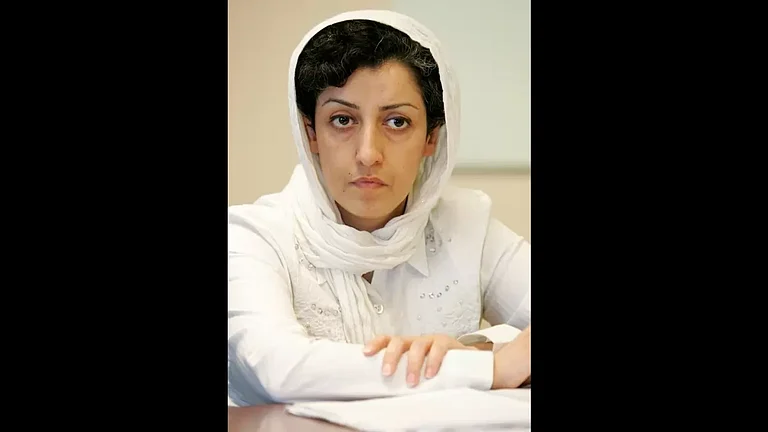But the media persisted. Finally, he opened his mouth. "Usually, I enjoy talking to the media but this time I have decided not to say anything," he said, adding, "Whatever needed to be said has been said in the joint statement." Outlook prompted him: "Are you going to call the beginning of this new chapter of India-Pakistan dialogue ‘Mohabbat zindabad’?"
"Yes, Mohabbat zindabad," he replied without much enthusiasm. Irritation was writ large on his face, as if he had been compelled to do something he did not want. This was surprising, considering that Pakistan had, in the past, offered to cooperate and jointly investigate acts of terrorism in India. Example: the blasts in Delhi before last Diwali.
Musharraf’s reticence was just an aspect of the mystery surrounding the decision to establish a joint mechanism to deal with terrorism. On the flight back from Havana to New Delhi via Frankfurt, the media fired a volley of questions at the PM, the national security advisor (NSA) and the foreign secretary-designate, Shiv Shankar Menon: Was Musharraf not duping India once again? With the real genie of terrorism in Pakistan being the ISI, how could it cooperate with RAW on terrorism? Was this joint mechanism practical? Would it work?
The PM exuded confidence in his replies, but even four days after his return to Delhi, reactions in the higher echelons of the government ranged from disbelief to cautious optimism. This largely stems from the fact that few in the governments on either side know the precise contours of this mechanism. "These are early days. We do not know what each side promised the other behind closed doors," said a source. Excluding the PM, the NSA and the foreign secretary-designate, everybody else, including the backchannel, is currently out of the loop. Nor has the PM briefed his cabinet colleagues. This is expected to happen sometime next week, and should hopefully unravel the mystery.
Partly, the prevailing confusion is due to the PM himself sounding tentative on the flight from Havana. He told the media on the flight, "I hope it works, but if it doesn’t work, then also we have to deal with the consequences." Was it an expression of his lack of conviction in Musharraf fighting terrorism?
First, the operative part of the Havana statement. It says: "The two leaders met in the aftermath of the Mumbai blasts. They strongly condemned all acts of terrorism and agreed that terrorism is a scourge that needs to be effectively dealt with. They decided to put in place an India-Pakistan anti-terrorism institutional mechanism to identify and implement counter-terrorism initiatives and investigations." (Apparently, in Havana, Musharraf was stiff due to the Mumbai reference in the statement.)
Senior sources on board the aircraft said India had been trying to get the Pakistanis to agree to this mechanism for the last two years. "The mechanism is yet to be worked out," said the PM on the plane. He sounded a note of caution too: "This mechanism that we are to put in place must be credible, must inspire confidence in both our countries and, therefore, we will have to look at the mechanics of the move with due care." Elsewhere, during the interaction in the plane, he said, "This is the best we could get in the circumstances."
Ironically, it’s Pakistan which has been publicly expressing its willingness to cooperate in investigations into bomb blasts in India. Apart from last year’s Delhi blasts, Islamabad made this offer following the recent Mumbai explosions. "Instead of unsubstantiated allegations and aspersions, if the Indian side has any concrete information, it should be shared with Pakistan and we would help with the investigation," Musharraf is reported to have said. The Pakistani contention has been that India tends to blame Pakistan even before the process of gathering evidence about a terrorist incident begins. A joint effort would compel India to measure its words, Pakistan presumes.
Senior government sources, however, stress the idea of a joint mechanism is India’s, that it is well-thought out, a result of exchange of several ideas between Manmohan and Musharraf through their emissaries. They say Menon has long been keen on a mechanism that could provide a platform on which Pakistan’s bluff could be called.
Though there is no clarity about the kind of counter-terrorism initiatives that will be undertaken as a result of this joint mechanism, some government sources say there is no harm in sharing with Pakistan, for instance, the frequencies on which the militants communicate. Once the frequency is given, anybody can tune in and verify for themselves the terrorist chatter. Again, it should be possible to furnish explicit details about Pakistani infiltrators who are routinely killed in Kashmir. "Why can’t we produce some of these people and present them to the Pakistanis?" asked a source. Lashkar-e-Toiba’s publications, for instance, routinely provide the details of their cadre killed in Kashmir, and the government had begun an exercise of matching the details of the dead Pakistanis with the printed details.
Critics in the government are not so sanguine. They argue that there is little sense in sharing operational intelligence with the very people who are controlling the levers of terror. It is from the ISI-controlled warehouses that explosives and weapons are supplied to infiltrators, who are entities that retired Pakistani army personnel train. In the past, these sources say, whenever they had shared radio frequencies, infiltration routes and sites of militant camps with a third country, these details were passed on to Pakistan. Promptly, the frequencies used for conducting communication among terrorists were changed, as were the camps and infiltration routes.
These critics argue that even if evidence on cross-border infiltration is furnished to Pakistanis, they would say: "We are trying our best but these fellows still manage to come in. Don’t you have a fence now that is supposed to stop them? How is it they are able to get past that and all the seven lakh soldiers who are deployed in Kashmir?"
Take Kargil’s example. Then, in May 1999, RAW had taped telephonic conversations between General Musharraf, who was visiting Beijing, and the Chief of General Staff Lt Gen Mohammed Aziz in Pakistan. These tapes nailed the Pakistani lie that its troops weren’t in the area. Though India made a telling point, the Pakistanis, warned of the leak, changed the channel on which the generals were communicating—and which had yielded rich intelligence. Not a squeak came out of it subsequently. "There is no sense," said an intelligence official, "in compromising your intelligence for the purpose of indulging in a process that will essentially be a dialogue of the deaf."
"It is a question of intention," said another intelligence source familiar with the issue. "If Pakistan’s intention is true, then there is no need for another body." This source points out that some nations with which India does not have a joint working group on terrorism have provided practical and useful intelligence. "It’s a question of political will; Pakistan’s intention is clearly malafide," he said.
Critics are amazed that Menon should have described Pakistan as a victim of terrorism. In doing so, they say, New Delhi has injudiciously conferred a moral equivalence to a state sponsor of terror. Indeed, Pakistan is a victim of terrorism. But most of it is either sectarian or emanates from Al Qaeda because of Musharraf’s support to the US. The joint mechanism will not help India, they say. "Rather it will now provide Pakistan a legitimate platform to voice its allegation that India is sponsoring some of the violence in Sindh, Balochistan and other places. It is going to degenerate into a farce," predicts one of them. Also, Pakistan can cite the joint mechanism to claim that Islamabad and New Delhi are together fighting terrorism, thus blunting India’s diplomatic offensive against its neighbour.
However, senior government sources counter this line of argument, saying the PM deliberately kept out of the debate the quality and nature of terrorism that Pakistan and India face, that no moral equivalence has been consequently established between the two. And yet, they contend, this shouldn’t gloss over the reality of Pakistan being a victim of terrorism as well.
But is Musharraf actually as worried about the terrorism racking India as he is about that which targets, say, him and the west? Not even once, say critics of the move, has Pakistan shared any information or intelligence that would have helped prevent an act of terror in India. On the other hand, India had, on two previous occasions, passed actionable intelligence on bids to eliminate Musharraf.
The proposed joint mechanism also conveys the impression that Pakistan is neither directly nor indirectly controlling the levers of terrorism directed against India. No, argue the defenders of the mechanism, saying it doesn’t give a clean chit to Musharraf whose January 2004 commitment to prevent acts of terrorism emanating from Pakistani territory has been largely observed only in the breach. A majority of the officials Outlook spoke to feel that sharing actionable intelligence—especially on a live, unfolding scenario like it happened in Kargil—is a risky proposition. They say Pakistan will use the interaction to enhance the deniability quotient which is already substantial.
Take the example of Shoaib Hassan, from Lucknow, and Mahabook Mondal, from North 24 Parganas district, who were picked up in connection with the blasts at the Varanasi railway station and the Sankat Mochan temple this March. Their interrogation revealed they had flown to Bangladesh on Indian passports. There they were met by a Pakistani minder who provided Bangladeshi passports to them and kept their Indian passports. They were flown on Bangladeshi passports to Karachi and then to Balochistan for arms training. Subsequently, they returned to Dhaka where their Bangladeshi passports were taken by their minder. They returned to India on Indian passports.
Critics in the government say should India confront the Pakistanis with this information, they would want proof, of which there is none. They would argue that this information was extracted using third degree methods and, therefore, not credible. It wouldn’t be sagacious for Indian intelligence agencies to share active telephone numbers and the like with the Pakistani intelligence. One, they know the numbers anyway. Two, once they become aware of the numbers India knows of, they would switch them off. A source described the last round of home secretary-level talks, where the question of terrorism was discussed, thus: "We presented evidence, they trashed it."
By Alok Mehta in Havana and V. Sudarshan in New Delhi

























